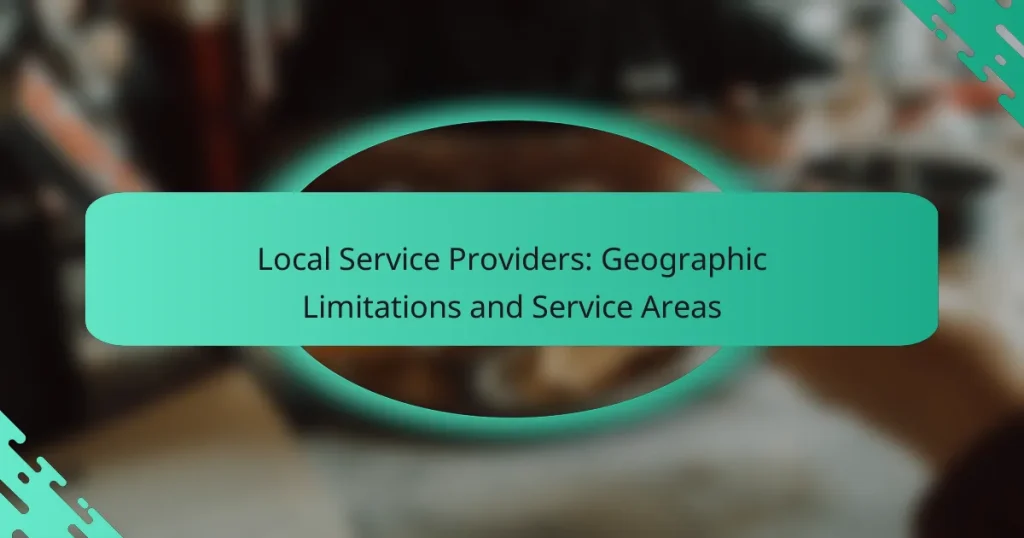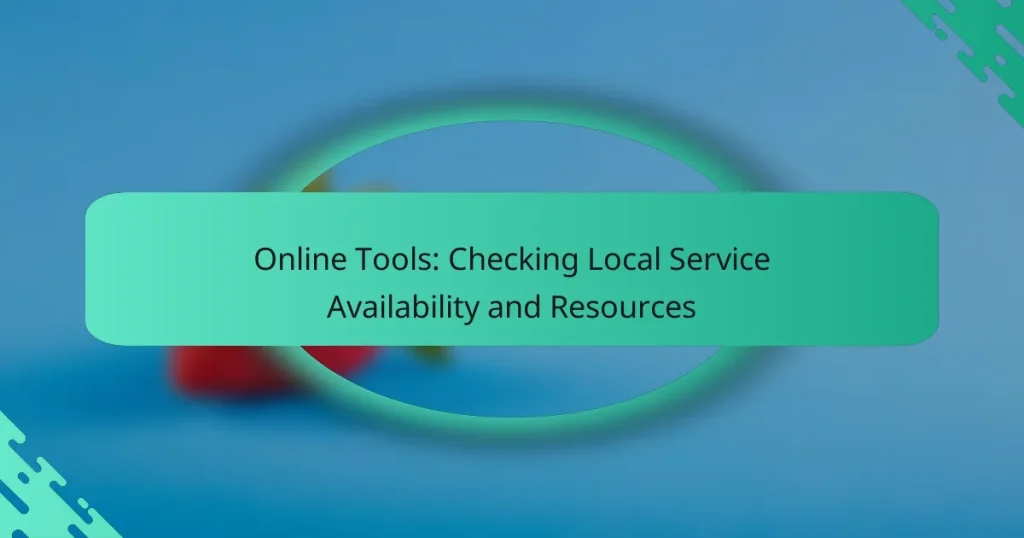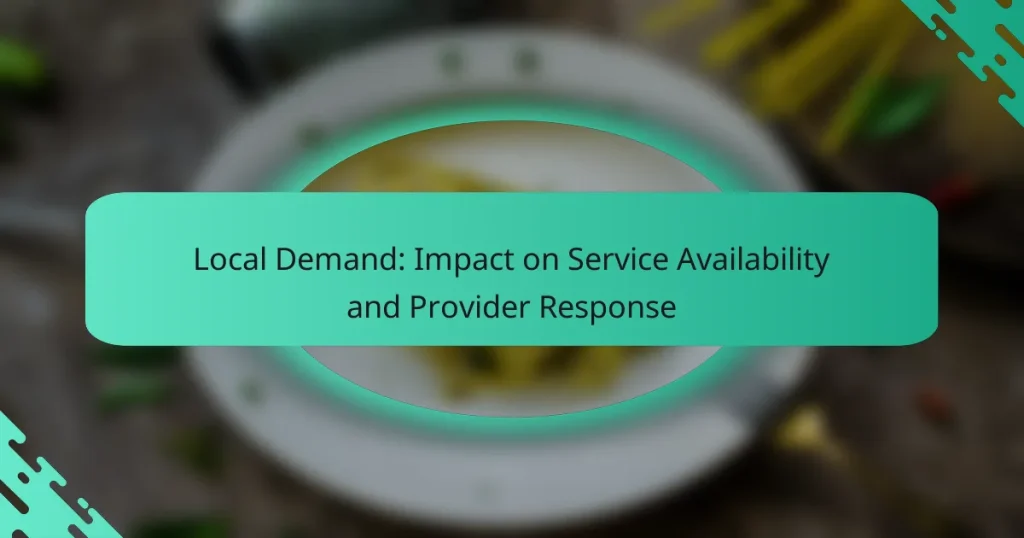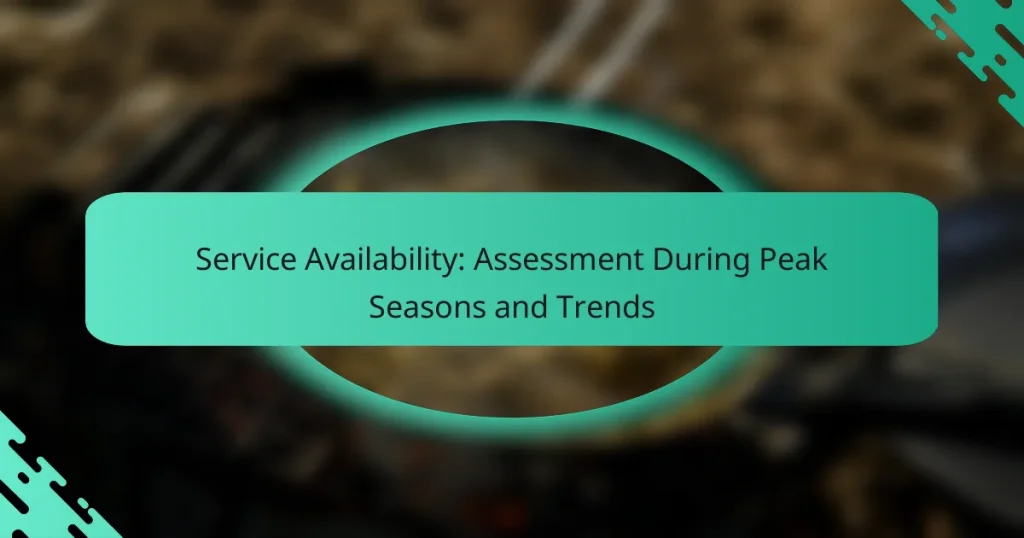Finding local service providers in your area can greatly enhance your access to essential services tailored to your community’s needs. From home repairs to personal services, these professionals offer a variety of solutions designed to meet immediate demands. To ensure you choose the right provider, it’s important to evaluate their reputation, qualifications, and pricing through reliable sources.
Online Tools: Checking Local Service Availability and Resources
Local Demand: Impact on Service Availability and Provider Response
Urban vs Rural Services: Availability Differences and Considerations
Local Services: Availability, Accessibility and Local Demand
Service Availability: Assessment During Peak Seasons and Trends
Service Area Maps: Meaning, Importance and Local Insights
How to find local service providers in Los Angeles?
To find local service providers in Los Angeles, start by utilizing online resources and community networks. These methods can help you identify reliable professionals in various fields, from home repairs to personal services.
Online directories
Online directories are a convenient way to search for local service providers in Los Angeles. Websites like Yelp, Angie’s List, and Thumbtack allow you to filter results by category, ratings, and proximity. This can help you quickly find options that meet your specific needs.
When using online directories, pay attention to customer reviews and ratings, as these can provide insights into the quality of service. Look for providers with a consistent track record of positive feedback to ensure reliability.
Local business listings
Local business listings, such as Google My Business, offer another effective way to find service providers in Los Angeles. These listings often include essential information like contact details, hours of operation, and customer reviews. You can view photos and read descriptions to gauge the services offered.
Utilizing local business listings can also help you discover nearby providers that may not appear in broader searches. Be sure to check for any special offers or promotions that local businesses might be running.
Community recommendations
Community recommendations are invaluable when searching for local service providers in Los Angeles. Asking friends, family, or neighbors for their experiences can lead you to trustworthy professionals. Social media platforms and neighborhood apps like Nextdoor can also facilitate these discussions.
When seeking recommendations, consider the specific needs you have and ask for providers who excel in those areas. Personal experiences can often highlight strengths and weaknesses that online reviews may not capture.
What services are commonly available locally?
Local service providers typically offer a range of essential services, including home repair, cleaning, and landscaping. These services are designed to meet the immediate needs of residents and businesses, often tailored to the specific demands of the community.
Home repair services
Home repair services encompass a variety of tasks, from plumbing and electrical work to general maintenance and renovations. Local providers can often respond quickly to urgent issues, such as leaks or electrical failures, which is crucial for minimizing damage.
When hiring a home repair service, consider checking for licenses and insurance to ensure quality and compliance with local regulations. It’s also wise to obtain multiple quotes to compare prices and services offered.
Cleaning services
Cleaning services range from residential housekeeping to commercial cleaning solutions. Many local providers offer customizable packages, allowing clients to choose services based on their specific needs, such as deep cleaning or regular maintenance.
When selecting a cleaning service, inquire about their cleaning products and methods, especially if you have allergies or prefer eco-friendly options. Additionally, check reviews and ask for references to gauge reliability and quality.
Landscaping services
Landscaping services include design, installation, and maintenance of outdoor spaces. Local landscapers can help enhance curb appeal and create functional outdoor areas, offering services such as lawn care, planting, and hardscaping.
Before hiring a landscaping service, consider your budget and the scope of work needed. It’s beneficial to view a portfolio of their past projects and discuss your vision to ensure alignment with your expectations.
How to evaluate local service providers?
To evaluate local service providers effectively, consider their reputation, qualifications, and pricing. Focus on gathering information from reliable sources to make informed decisions that meet your needs.
Check reviews and ratings
Reviews and ratings provide insight into the experiences of previous customers. Look for feedback on platforms like Google, Yelp, or local service directories to gauge overall satisfaction and reliability.
Pay attention to both the quantity and quality of reviews. A provider with numerous positive reviews is often a safer choice than one with only a few ratings, even if they are mostly favorable.
Verify licenses and permits
Ensuring that a service provider has the necessary licenses and permits is crucial for legal compliance and quality assurance. Check with local regulatory bodies to confirm that the provider meets industry standards.
Different services may require specific licenses, so familiarize yourself with local regulations. For instance, contractors often need a general contractor’s license, while electricians may require specialized certifications.
Request quotes and estimates
Obtaining quotes and estimates from multiple providers allows you to compare prices and services. Be clear about your needs and ask for detailed breakdowns to understand what you are paying for.
When reviewing quotes, consider not only the total cost but also the scope of work included. This can help you avoid hidden fees and ensure you are getting the best value for your investment.
What are the typical response times for local services?
Typical response times for local services vary significantly based on the type of service required. Emergency services often respond within minutes, while standard services may take hours or days, depending on availability and scheduling.
Emergency services response
Emergency services, such as fire, police, and medical assistance, generally aim to respond within minutes. In urban areas, response times can be as low as 5-10 minutes, while rural locations may see longer waits, typically around 15-30 minutes. Local regulations often dictate these response time standards to ensure public safety.
Factors affecting emergency response times include traffic conditions, the distance to the service provider, and the nature of the emergency. It’s crucial to provide clear information when calling for help to facilitate a quick response.
Standard service response
Standard service responses, such as plumbing or electrical work, usually take longer, often ranging from a few hours to a couple of days. The response time can depend on the service provider’s workload, the time of day, and the urgency of the request. For instance, a leaking pipe may prompt faster service than a routine electrical inspection.
When seeking standard services, it’s advisable to inquire about estimated response times upfront. This helps set expectations and allows for better planning, especially if the service is time-sensitive.
Appointment scheduling
Appointment scheduling for local services typically requires advance notice, often ranging from a few days to a week. Many providers have set schedules and may prioritize urgent requests, so it’s beneficial to book early for non-emergency services.
To ensure a smooth scheduling process, consider calling during business hours and providing detailed information about your needs. This can help the service provider allocate the right resources and minimize delays.
What factors affect local service pricing?
Local service pricing is influenced by several key factors, including the type and complexity of the service, geographic location, and market demand. Understanding these elements can help consumers make informed decisions and budget accordingly.
Service type and complexity
The type of service being provided plays a significant role in determining pricing. For example, basic services like lawn care typically cost less than specialized services such as electrical repairs or plumbing work. Additionally, the complexity of the task can increase costs; intricate projects may require more skilled labor and longer timeframes, leading to higher fees.
When evaluating service options, consider whether the service requires specialized tools or certifications, as this can also impact the overall price. Always ask for detailed quotes that break down labor and material costs to better understand pricing structures.
Geographic location
Pricing for local services can vary widely based on geographic location. Urban areas often have higher costs due to increased living expenses and demand for services, while rural areas may offer lower prices but potentially fewer service options. For instance, hiring a handyman in a major city may cost significantly more than in a small town.
It’s essential to research local rates and compare them across different regions. Websites that aggregate service provider reviews and pricing can provide valuable insights into what to expect in your area.
Market demand
Market demand is a crucial factor affecting service pricing. During peak seasons, such as summer for landscaping or winter for heating repairs, prices may rise due to increased demand. Conversely, off-peak times might see lower rates as providers compete for business.
To navigate pricing effectively, consider scheduling services during off-peak times when possible. Additionally, staying informed about local trends can help you anticipate price changes and plan your service needs accordingly.
How to ensure compliance with local regulations?
To ensure compliance with local regulations, familiarize yourself with the specific laws governing your industry and location. This involves understanding zoning laws, licensing requirements, and any other relevant local ordinances.
Research local laws
Start by identifying the laws that apply to your business type in your area. This may include regulations on health and safety, environmental impact, and labor practices. Utilize local government websites, chambers of commerce, and legal resources to gather accurate information.
Consider consulting with a legal expert who specializes in local regulations to clarify complex issues. They can provide insights into any recent changes in the law that may affect your operations.
Obtain necessary permits
Once you understand the local laws, determine which permits are required for your business. Common permits include business licenses, health permits, and construction permits, depending on your industry. Check with your local government office for a comprehensive list of necessary permits.
Ensure you apply for these permits well in advance of starting operations, as processing times can vary significantly. Keep track of renewal dates and compliance requirements to avoid penalties or disruptions to your business.






